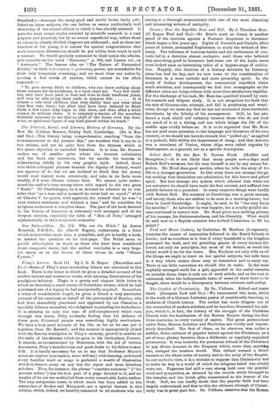Genoa ; How the Republic Rose and Fell. By J.
Theodore Bent. (C. Began Peal and Co.)—Mr. Bent's work on Genoa is another proof of the reaction against a Teutonic despotism in literature which began a few years ago. Taylor of Norwich and Carlyle, after years of labour, persuaded Englishmen to study the writers of Ger- many. The influence of business habits and the enthusiasm of con- verts led to a devotion almost exclusive, until those who believed that something good in literature had come out of the Latin races were looked upon as interesting relics of a bygone stage of cultiva- tion. Happily, this doctrine of a literary salvation by Germany alone has had its day, and we now come to the consideration of literature in a more catholic and more promising spirit. In the study of Italian development, the commercial republics claim much attention, and consequently we find that monographs on the different cities are being written with more than satisfactory rapidity. For the discharge of his task, Mr. Bent has qualified himself by care- ful research and diligent study. It is not altogether his fault that the tale of Genoese rise, triumph, and fall is perplexing and weari- some, though we must say that he has not minimised these inevitable drawbacks by the felicity of his arrangement. Still, he has pro- duced a book which will certainly interest those who do not read too much of it at a sitting, and one which brings the life of the middle ages vividly before us. It is to be regretted that Mr. Bent has not paid more attention to the language and literature of his own country, or we should not have to remark that " pulled up," as applied to a podestk, falls within the department of slang ; and that Antonio was a merchant of Venice, whose ships were called argosies by Shakespeare, as a general, not as a specific description.






































 Previous page
Previous page